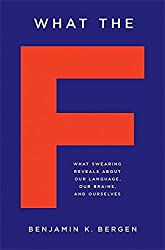
Rating: 8.0/10.
Book Review: What the F: What Swearing Reveals About Our Language, Our Brains, and Ourselves by Benjamin K. Bergen
Book by psycholinguistics researcher Benjamin Bergen from UCSD, about the linguistics of profanity. It is unusual to do academic research on swear words like “fuck” and “nigger”, but the author compares it to studying an infant’s diaper to determine its health condition: unpleasant but a useful way to obtain information. Profanity offers us a window into language processes that we can’t observe otherwise.
Swear words tend to come from four categories: religious (eg: “holy”), sex (eg: “fuck”), excrement (eg: “shit”) and racial slurs (eg: “nigger”), but languages differ on the distribution of them. In English, the most offensive swear words are the “nigger” type, while Quebecois French has more religious profanity. Swear words tend to be monosyllabic, about 4 letters, and have a closed syllable, and this is hard to explain by chance or frequency, but this pattern is not linguistically universal. Possible that short, closed words are more physiologically suitable for swearing, but it could also be a historical accident.
Profane gestures tend to also have sexual origins (eg: the middle finger) but are also somewhat arbitrary and differs between cultures. However, they don’t have direct sexual associations since they don’t prime sex-related words. Patients with aphasia and brain damage are sometimes able to swear (but unable to speak otherwise), which is evidence that swearing arises from a different part of the brain than regular speech.
People make fewer speech errors involving profanity, which is evidence for a sort of internal “filter” between the generation and speech production steps. Pope Francis famously uttered the profanity “in questo cazzo” (in this fucking…) when he intended to say “in questo caso” (in this case) — this might be because he was a non-native Italian speaker and didn’t know that “cazzo” was a swear word.
Syntactically, profanity can behave differently from usual language, for example, “fuck you” does not have an explicit subject and is also not an imperative. Swear words undergo a process of semantic change, where it acquires a profane meaning, then speakers avoid using the word due to its association with the profane sense, so the older meaning gets displaced.
Some have tried to ban swear words, arguing it’s harmful to children, but there is little evidence of this. It is hard to run experimental studies that control for causation and correlation. There is stronger evidence that racial slurs like “nigger” and “chink” is harmful to the affected group, so we should avoid using these types of profanities.
Overall, this is a well-written book about psycholinguistics and sociolinguistics with lots of references to the literature. Discussions of profanity tends to be avoided in linguistics textbooks and papers, which is fair enough, but Bergen shows us what interesting phenomena are there if we are willing to put aside our taboo for the subject.



